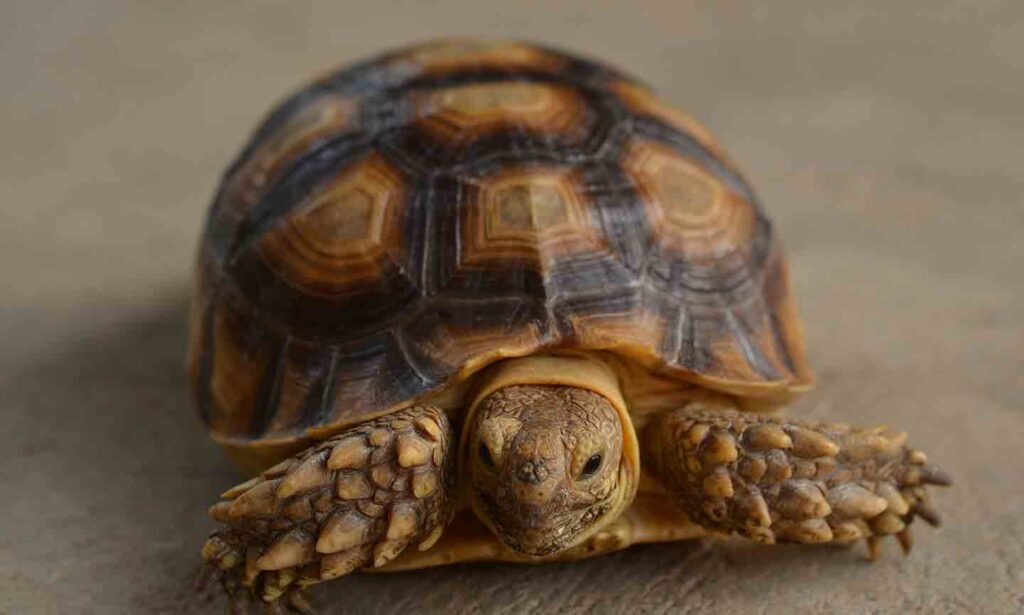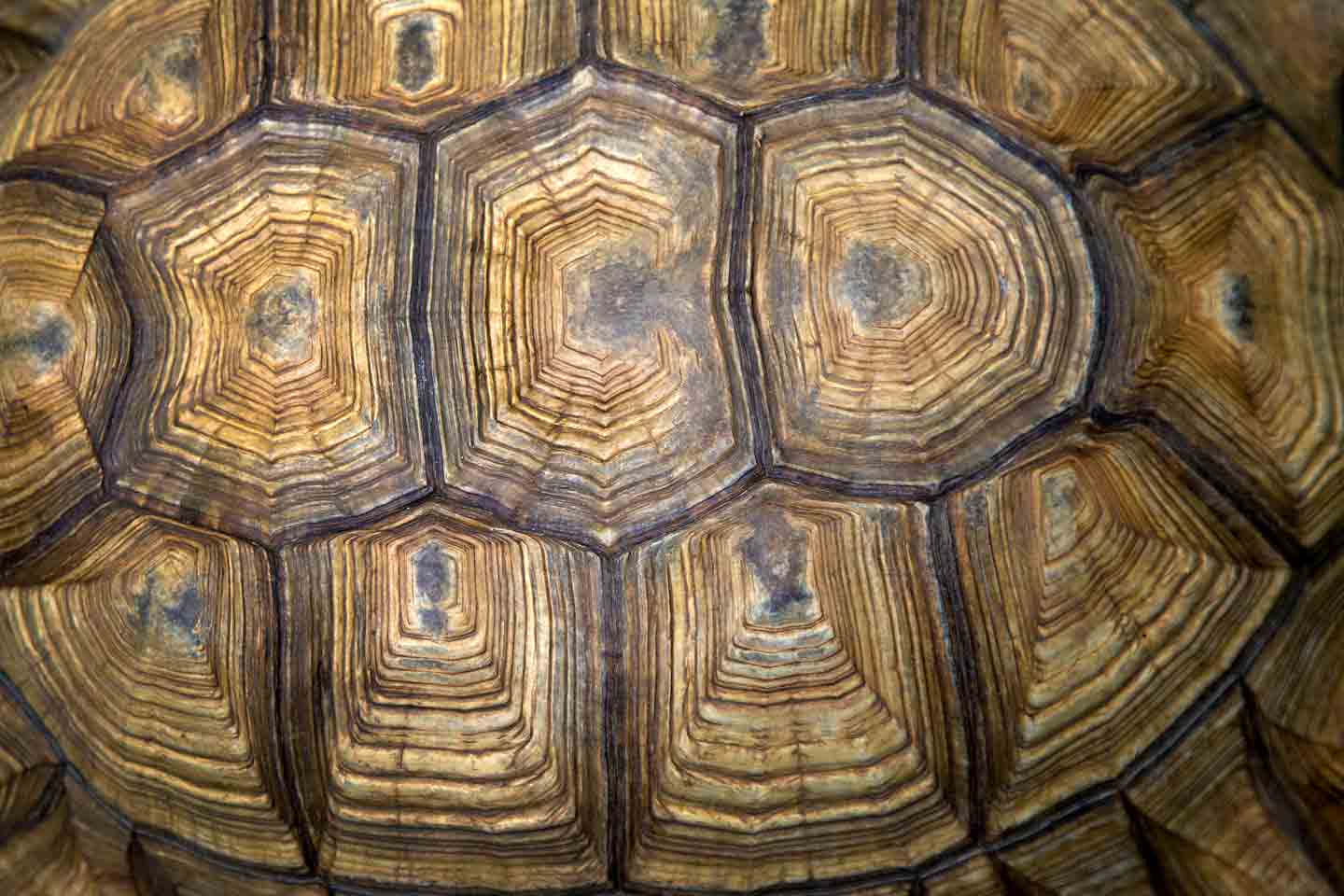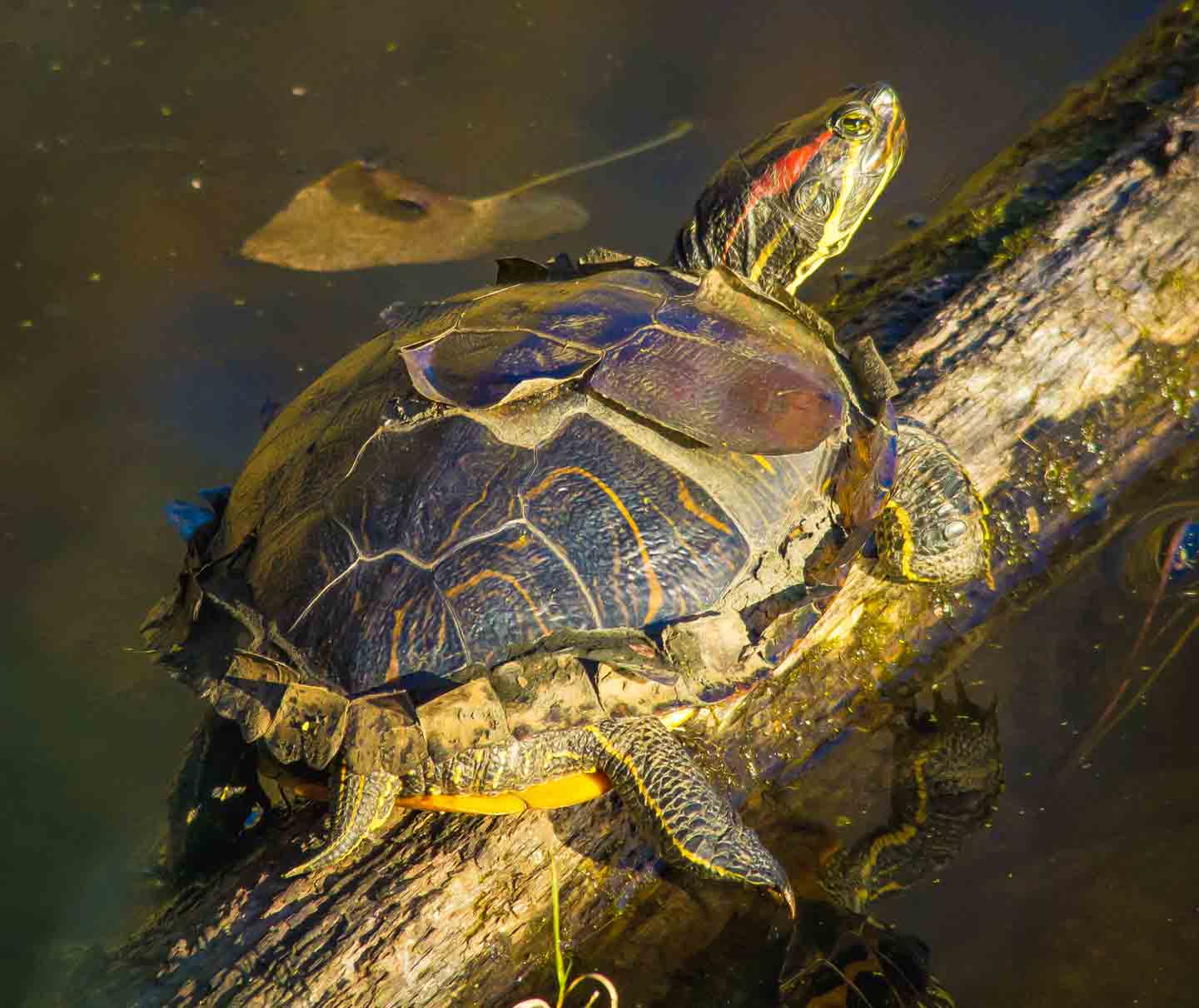What Is a Turtle Shell Made of, and Why Does It Shed?

Photo by eve_eve01genesis/iStock/Getty Images Plus
What Is a Turtle’s Shell Made Of?

Suthat_Chaitaweesap/iStock/Getty Images Plus
A turtle’s shell may look like a protective housing they carry around—similar to a suit of armor that can be removed as desired—but in reality, a turtle’s shell is an inseparable part of a turtle’s anatomy. It consists of layers of large keratinous scales that grow with the turtle, providing protection for the turtle’s bones and internal organs.
To understand a turtle’s shell, it’s important to first establish the basics of turtle skeletal anatomy. Imagine a turtle’s skeleton as a hollow structure made of bone and divided into two parts, the carapace and the plastron.
The carapace consists of the turtle’s vertebrae and rib cage, which fuse together to form the convex top of the skeleton. Think of it as the turtle’s spine. The flat underside of the skeleton is called the plastron. It’s made up of nine flat bones plus two bony plates, called epiplastra, which fulfill the same role as clavicles (collarbones) in other vertebrates. The plastron also contains the bridge struts, which connect it to the carapace on either side of the body.
The shell of a turtle covers the outside of the skeleton, growing over the top of a very thin layer of subcutaneous tissue, or skin. It consists of dozens of scale-like plates, called scutes. These scutes are made of keratin and vary in color or pattern depending on the species.
Why Do Turtles Have Shells?
Teresa Manucy, DVM, a telehealth veterinarian at Chewy in Plantation, Florida, says, “A turtle’s shell serves as protective armor to defend against external threats from predators and pathogens.” Aaron Caswell, a biologist on the turtle team at The Florida Aquarium in Tampa, Florida, adds that “the shell acts as a gradient to absorb heat when the animal needs to thermoregulate or bask.”
Of course, most people know that a turtle’s shell serves a protective purpose—but there are contradictory theories regarding the origin of the turtle shell. Experts in natural history have proposed numerous theories, many of which paleontologist Hans-Dieter Sues, PhD, summarizes in a 2019 article published in “Smithsonian Magazine.” In the piece, Dr. Sues proposes two possibilities: The turtle shell suddenly evolved as a complex, fully formed structure or it developed in a series of steps.
Prior to the 19th century, many researchers believed bony plates embedded in the skin of ancestors to the modern turtle eventually fused to the underlying bones creating a solid shell. More recent theories suggest that different parts of the shell developed from different parts of the turtle’s skeleton.
New paleontological discoveries revealing potential intermediary species between prehistoric and present-day turtles support this latter theory, but there is still much to be explored.
Why Do Turtles Shed?

ChristinaPrinn/iStock/Getty Images Plus
Turtles don’t shed their shell all at once, but may shed layers of the shell or individual scutes for various reasons. The primary reason for shedding is to accommodate growth.
Because a turtle’s shell is an integral part of its anatomy, it must expand as the turtle grows. New scutes are produced in the thin layer of tissue covering the bony skeleton known as the epithelium, growing up from under the existing scutes.
The shedding process may look different in terrestrial versus aquatic turtles. For terrestrial turtles like the eastern box turtle, the outer layer of keratin on the shell may gradually peel or flake away. For aquatic turtles like the green sea turtle, leatherback, or hawksbill turtle, shedding occurs along individual scutes.
A tortoise shell doesn’t shed at all. New scutes simply grow under the old ones, sometimes giving segments of the shell a raised appearance. This is called pyramiding.
Outside of normal growth, shedding can help the turtle replace damaged scutes. For many aquatic species, Dr. Manucy adds, “is necessary to reduce the shell’s thickness so it stays streamlined and helps remove algae or infections on the surface of the shell.”
Turtle Shell Diseases and Conditions
Excessive shedding is a common sign of poor health in turtles, but lack of shedding can indicate problems as well.
Dr. Manucy explains that abnormal shedding is often the result of inadequate environmental conditions, poor diet, or disease. She says, “Freshwater turtles may not shed if their diet is low in vitamin D, when the water temperature is too low, or with inadequate calcium or UV light.”
If a turtle’s shell becomes damaged, it leaves the turtle susceptible to shell rot. Bacteria or fungus can make their way into the shell, potentially exposing the underlying bone to infection. “Shell rot is more common in aquatic turtles,” says Dr. Manucy, “and should be addressed right away. It can also spread from one turtle to another.”
Other conditions that can affect a turtle’s shell include metabolic bone disease; a bacterial infection seen in aquatic turtles called septicemic cutaneous ulcerative disease (SCUD); and crustacean bacteremia—caused by bacteria commonly found in crustaceans like crayfish.
FAQs About Turtle Shells
Do all turtles have 13 shells?
All turtles have one shell; the number of scutes in each shell depends on the species. All turtles have five vertebral scutes down the center of the carapace with four pairs of costal scutes on either side. Cryptodiran turtles—sea turtles, tortoises, snapping turtles, and softshell turtles—have 12 pairs of scutes around the edge of the shell while Pleurodiran turtles, also known as side-necked turtles or terrapins, have 13 pairs.
Are turtles’ shells attached to their bodies?
Yes. However, it’s more accurate to say a turtle’s shell is a structural component of the body—not just attached to it.
Can you surgically remove a turtle’s shell?
No. Dr. Manucy says, “A turtle’s shell cannot be surgically removed, as it encompasses portions of the musculoskeletal system that are essential for survival.” If it becomes necessary to remove a portion of the shell for a surgical procedure, a permanent patch is needed.
Do turtles shed their shell every year?
Not as a whole. “For most turtles, the scutes are not shed,” says Dr. Manucy, “but instead new, wider ones are produced under older ones, which ensures the shell expands as the turtle grows.” The exception is some aquatic turtles like the painted turtle, which annually shed the outer layer of individual scutes.
You don’t have to be a reptile expert to take good care of your pet turtle, but you do need to understand their basic needs. A balanced diet, for example, plays a key role in keeping your turtle and their shell healthy. Learn more about how to feed a pet turtle.
Expert input was provided by Teresa Manucy, DVM, a telehealth veterinarian at Chewy, in Plantation, Florida; and Aaron Caswell, a biologist at The Florida Aquarium in Tampa, Florida.
This content was medically reviewed by Chewy vets.



